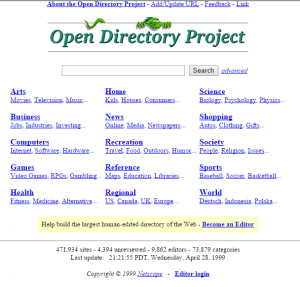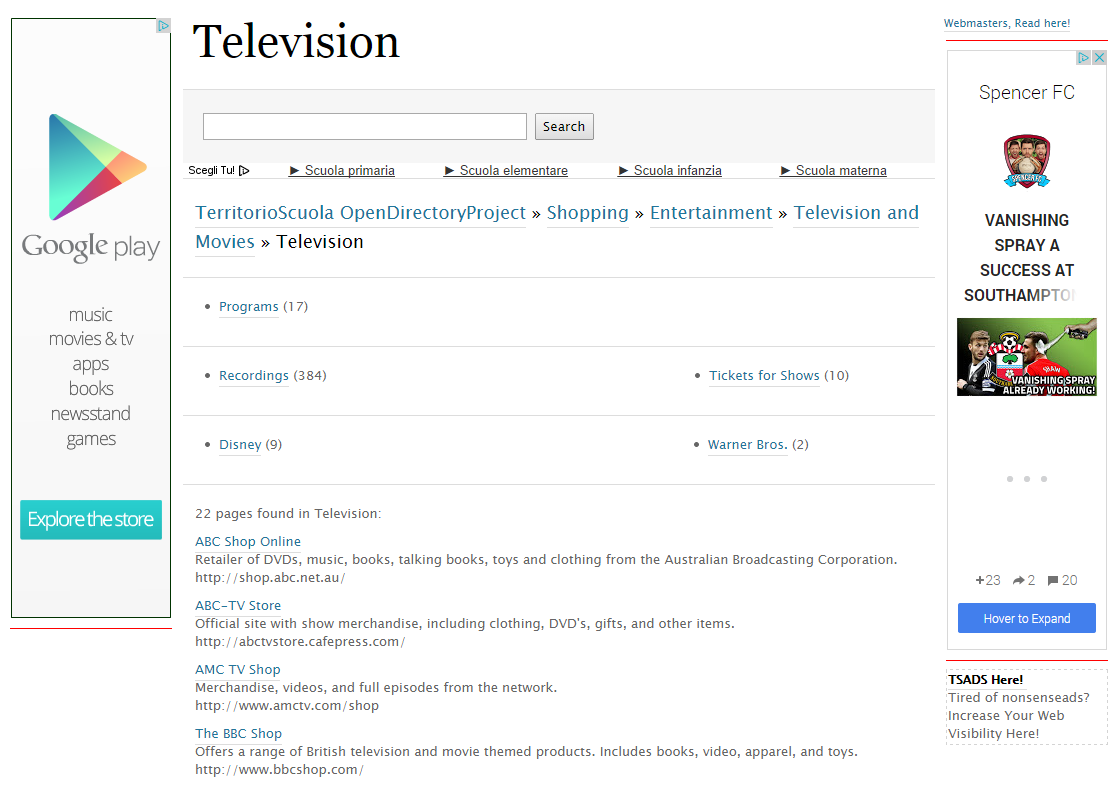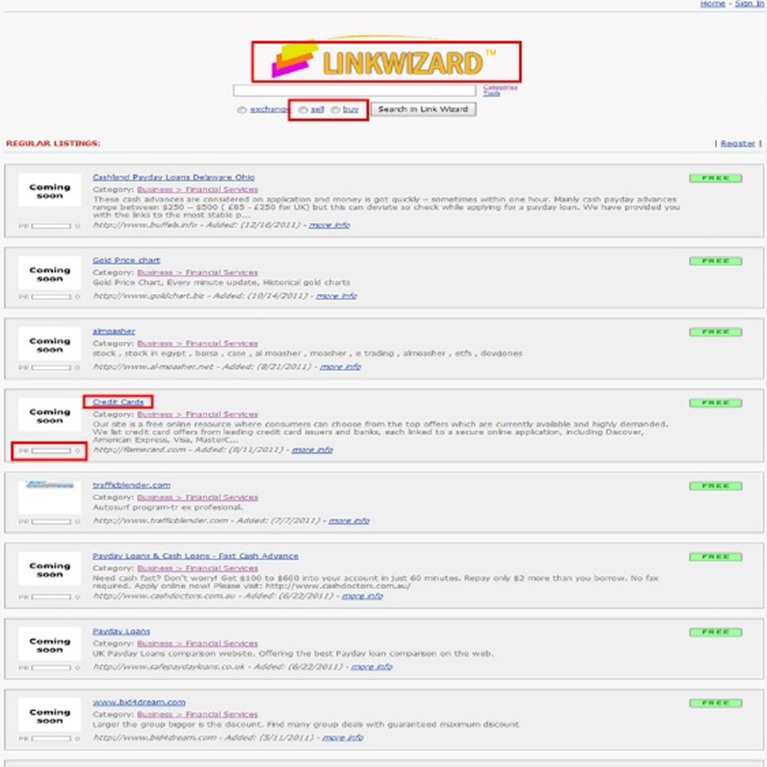Web directories
Page Contents
A web directory is a website that contains an organised list of numerous external links categorised into various topics and hierarchies. Many directories attempt to be all encompassing and cover a wide as possible number of link categories and sub-categories, whilst others concentrate on a specific subject or locality.
Broadly speaking, web directories provided a means for users to find websites they may be interested in before the widespread proliferation of search engines. Directory listings were one of the main ways to attract traffic to a website at one time. Subsequently, search engines have used the links from directories, along with other metrics, in determining their Search Engine Ranking Positions.
Earliest directories
Sir Tim Berners-Lee, creator of the World Wide Web, created the first index of the web, and ergo the first web directory, the The World Wide Web Virtual Library in 1991.
Yahoo! Directory
Initially known as “Jerry and David’s Guide to the World Wide Web” the Yahoo! Directory was launched in 1994.
Initially Yahoo accept both free and expedited paid submissions. The directory now only accepts paid submissions. Whilst it may seem like hair splitting, technically Yahoo! Directory links are not paid manipulative links. Yahoo! does not promise the gain of link equity as the reason for the payment, rather the payment is for the processing of the submission. Yahoo! make no promise of including a link within the directory just becuase payment has been made. The payment only guarantees a review of the link.
These statements are not an endorsement of obtaining a new paid Yahoo! Directory link. Rather, the point here is that you already have a link from Yahoo do not feel compelled to remove or disavow it simply because Yahoo! appears to be a ‘paid directory’. Remember, many of the links within the directory have been placed naturally via an editorial process. Whilst a link from the Yahoo! Directory may not as ‘powerful’ as it once was, these links do not need to be disavowed.
DMOZ directory
In response to the corporate web directory that was the Yahoo Directory, a new directory was formed broadly around ‘open source’ principles. This means that the ‘open content’ within DMOZ can be re-used and modified by other parties, now under a Creative Common Licence. DMOZ was constructed, and is maintained, by a community of volunteer editors.
In the past at least, DMOZ was viewed as a trusted ‘seed site’ by Google. If you have a link from dmoz.co.uk do not remove or disavow the URL or the domain on which it resides.
DMOZ mirrors
The data available within the DMOZ directory can be re-used by anyone under a Creative Commons Licence. In practice this means that there are a huge amount of DMOZ mirrors available on the web. These mirrors are based on DMOZ data at various points in time. It is highly unlike that you would be able to get these links removed from these mirrors (due to the technical method via which they are generated) even if you decided to do so.
On the face of it these links could be viewed as an added bonus to a link profile. The decision whether to disavow or keep these links though is not as simple as that.
More often than not, DMOZ mirrors are placed onto low quality websites, often with low quality copy, whose link profile itself is built on spammy links, and often haven’t been updated for a significant amount of time. The content itself is simply a copy of content available elsewhere on the web many times overs.
Most links from these sites are unlikely to be passing any real value to the target domain. There does though exist the possibility that these links sit on websites that are viewed negatively by Google.
As such, the majority of DMOZ mirror links should be removed or disavowed.
There are of course exceptions to the above. DMOZ mirrors can appear on quality, trusted websites, such as an academic institution. In these much rarer cases there is an argument for keeping these links. Remember though, that this is likely to be the exception rather than the rule when it comes DMOZ mirrors.
Directory proliferation & identification
The perception (and reality) that obtaining links from directories would increase the SERPs of a website lead to a frenzy of new directories being created in the early to mid-part of the first decade of the 21st century. These directories were designed with the purpose of passing link equity rather than helping users find a website they may be interested in. These are low quality websites, with a poor link profile, offering no real to the web as a whole.
Dependent on the submission requirements of the directory, these links would often contain commercial anchor text. Whilst these directories would often moderate the links submitted to them, the quality control on these directories broadly speaking was usually very low. Many of these websites look very similar to each other being all based on a relatively small number of web directory software solutions. These directories often would utilise the keywords ‘SEO’, ‘links’ or ‘directory’ within their domain names or URL structure (a very clear footprint for search engines to identify).
It is these type of directory links that need to be removed or disavowed.
During this time, some web directory attempt to differentiate themselves and become high(er) quality websites, offering more than simply a poor quality directory. There also exists a number of web directories (beyond DMOZ and Yahoo!) that maintained their high quality editorial policy. In comparison
Agency directory practices
It was common practice for many SEO agencies to undertake mass directory link submissions when starting a new SEO campaign. It was normal practice to build 100s+ of web directory links into a target website at one time. Many organisations offered this as a white label paid service to SEO agencies.
If you have undertaken any level of SEO with a agency within the past few years it is likely that you have had poor quality directory links built into the website.
Local & niche directories
Certain types of directories still offer link authority value and can be viewed as positive non-manipulative links.
Local web directories are often prove to be very important in gaining good local search engine ranking positions. If these directories are maintained and updated by either the webmaster themselves or an associated community then these links should not be disavowed. A typical example of a local directory may be a directory associated with a local business chamber of commerce website.
There also exists a number of directories in and around particular subjects, such as environmentalism. Again, if these are real directories, that have not suffered from a large amount of spammy links and maintained a high editorial quality then these links can remain as part of the profile.
Directory manipulative link types
Beyond the directories that simply accept free submissions for editorial review there are also a number of other link types that are present within in many directories.
- Reciprocal link
- Paid link submission
- Featured listings
- Bid for position
Based on learning elsewhere within this guide (see the links above for more information) these types of links are clearly manipulative and should be disavowed.
Nowadays directories are a thing of the past and the vast majority of them offer no value. Links from these directories should be removed and the domains disavowed. There may be occasional instances where a site is listed on a niche directory; these links should be marked as nofollow by the webmaster and disavowed at URL level.
Example of a Directory Link
Not only is the name of the directory ‘Link Wizard’, it is also clearly designed to pass PageRank, as it even contains a link on the homepage to a PageRank Checker!
Expert Tips
- Due to the poor URL formation of link directories, they can often produce many indexed links in Google as a by-product of pagination. It is therefore recommended (as with all websites you want nothing further to do with) that you disavow links at domain level in addition to removing the links where possible.
- If you are trying to get a link removed from a directory, you should do some research to make sure that your link removal request gives the webmaster the specific URL. We recommend this because links on category pages may be transient and disappear when visited.



